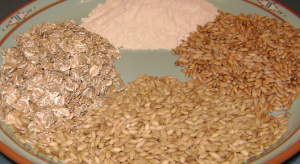Fresh news from the gluten front: An article in the journal Nature Structural and Molecular Biology, features research that shows “the molecular basis for immune recognition of gluten in patients with celiac disease.” The findings come from ImmusanT, a company that has made its mission the restoration of gluten tolerance, as well as the elimination of gluten-free diets from individuals suffering with celiac disease.
The research has provided scientists to examine just how celiac patients’ T cells (white blood cells that have an important function within the immune system) are able to identify the components of wheat gluten that trigger celiac disease in the first place. The article does us a favour by refreshing us on how exactly a gluten allergy works: A patient consumes the gluten protein, but instead of getting nutrients from that consumption, the immune system sends T cells to fight the proteins. This action from the T cells irritates and damages the small intestine, while blocking the absorption of important nutrients from the gluten. This research impacts a vast majority of celiac patients- roughly 90%- and while the remaining 10% have yet to be researched, as this patient majority carries an immune recognition gene known as HLA-DQ2.5.

According to the article, the research itself has revealed how, in these patients, the T cells bind to the molecular complex that is in turn formed by the gluten peptide attached to that gene.
Leslie Williams, President and CEO ImmusanT, has said that this research serves as a confirmation for suspicions of how gluten intolerance works on a molecular level. ImmusanT is currently producing a vaccine that hopefully can eliminate this gluten intolerance. The vaccine, called NexVax2, works on a microscopic front, targeting the problem T cells and rewiring them to help absorb, not attack nutrients from gluten.
Those with gluten intolerances who suffer from celiac disease find the disorder triggered by the consumption of grains such as rye and wheat. However, the only effective treatment for those afflicted with celiac disease is the avoidance of foods or substances containing gluten altogether. This is easier said than done, and many who try to eliminate gluten from their diets are still exposed to it in some way, and in turn suffer some damage done to the small intestine.
When untreated, celiac disease can contribute to a child’s poor performance in the classroom. In adults, the disease is associated with decreased bone health, cancer, dermatitis, short stature, and pregnancy issues.